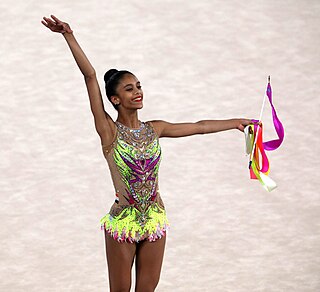
Rhythmic gymnastics is a sport in which gymnasts perform on a floor with an apparatus: hoop, ball, clubs, ribbon and rope. The sport combines elements of gymnastics, dance and calisthenics; gymnasts must be strong, flexible, agile, dexterous and coordinated. Rhythmic gymnastics is governed by the International Gymnastics Federation (FiG), which first recognized it as a sport in 1963. It became an Olympic sport in 1984, with an individual all-around event. The group all-around competition was added to the Olympics in 1996. At the international level, rhythmic gymnastics is a women-only sport. The most prestigious competitions, besides the Olympic Games, are the World Championships, World Games, European Championships, European Games, the World Cup Series and the Grand Prix Series. Gymnasts are judged on their artistry, execution of skills, and difficulty of skills, for which they gain points. They perform leaps, balances, and rotations along with handling the apparatus.

At the 1996 Summer Olympics, two different gymnastics disciplines were contested: artistic gymnastics and rhythmic gymnastics. The artistic gymnastics events were held at the Georgia Dome from July 20–25 and July 28–29. The rhythmic gymnastics events were held at Stegeman Coliseum in nearby Athens, on the campus of the University of Georgia from August 1–4.
At the 1988 Summer Olympics, two different gymnastics disciplines were contested: artistic gymnastics and rhythmic gymnastics. The artistic gymnastics events were held at the Olympic Gymnastics Hall in Seoul from September 18 through 25th. The rhythmic gymnastics events were held at the same venue from September 28 through 30th.
These are the results of the rhythmic group all-around competition, one of the two events of the rhythmic gymnastics discipline contested in the gymnastics at the 2004 Summer Olympics in Athens. The qualification and final rounds took place on August 26 and August 28 at the Galatsi Olympic Hall.
These are the results of the rhythmic group all-around competition, one of the two events of the rhythmic gymnastics discipline contested in the gymnastics at the 1996 Summer Olympics in Atlanta. The women's rhythmic group all-around was contested for the first time at these Games.
Valeriya Davidova is an Uzbekistani rhythmic gymnast of Russian origin.
Maria Kakiou was a Greek group rhythmic gymnast. She represents her nation at international competitions.

Milena Baldassarri is an Italian individual rhythmic gymnast. She won silver in the ribbon final at the 2018 Rhythmic Gymnastics World Championships. She competed at the 2020 Summer Olympics in the individual all-around.

The 2019 Rhythmic Gymnastics World Championships were held in Baku, Azerbaijan from 16 to 22 September 2019. The competition took place at the National Gymnastics Arena and served as a qualifier for the 2020 Olympic Games. There were Olympic berths awarded to 16 individuals and 5 groups. There were 301 participating athletes from 61 countries.

The 2021 Rhythmic Gymnastics World Championships were held from 27 to 31 October 2021 in Kitakyushu, Japan.

Tia Sobhy is an Egyptian rhythmic gymnast, and 3 time gold medal winner in the 2016, 2018 and 2020 African Rhythmic Gymnastics Championships.
Natalie Raits is an Israeli group rhythmic gymnast.

Margarita Kolosov is a German rhythmic gymnast. She is a two-time German all-around champion. She is also a two-time team silver medalist at the World Championships

Carmel Kallemaa is an Estonian-born Canadian rhythmic gymnast. She is a Commonwealth Games champion and a Pan American Championships medalist.
Rana Tokmak is a former German rhythmic gymnast. From 2013 to 2016 she trained with the national team group at the federal base in Fellbach.
Diana Svertsov is an Israeli rhythmic gymnast. She won gold in the group All-Around at the 2022 European Championship and silver in the same category at the 2022 World Championships. She will represent Israel at the 2024 Summer Olympics in Paris in the Women's rhythmic team all-around on August 9-10, 2024.
Mireia Martínez is a Spanish rhythmic gymnast. She's the bronze All-Around and 5 hoops medalist at the 2022 World Championships.
Patricia Pérez is a Spanish rhythmic gymnast. She's the bronze All-Around and 5 hoops medalist at the 2022 World Championships.
Valeria Márquez is a Spanish rhythmic gymnast. She's the bronze All-Around and 5 hoops medalist at the 2022 World Championships.
Inés Bergua is a Spanish rhythmic gymnast. She's the bronze All-Around and 5 hoops medalist at the 2022 World Championships.







